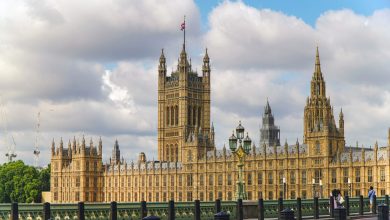Hundreds attend anti-immigration protest outside Norwich asylum hotel

The streets of Norwich, a city in eastern England, were filled with tension and protest on a summer Saturday afternoon. On July 26, 2025, hundreds of people gathered outside the Brook Hotel, which has been housing asylum seekers, to express their discontent and frustration. The scene was reminiscent of the violent protests that had erupted earlier in the week in Epping, Essex, where two men were charged with violent disorder and other offenses. The protesters in Norwich, armed with St George’s flags and signs, chanted slogans such as “We want our country back” and “Stop the invasion,” making it clear that their presence was a demonstration against the housing of asylum seekers in the hotel.
As the crowd of around 400 anti-immigration protesters faced off against 150 counter-protesters, the atmosphere was charged with emotion and passion. The protesters, who had gathered to voice their opposition to the asylum seekers being housed in the hotel, were met with a strong police presence, which helped to maintain order and prevent the situation from escalating into violence. The police cordon kept the two groups apart, and despite some tense moments, the event ultimately ended peacefully, with no arrests made. The organizer of the protest, Glen Saffer, was quick to point out that the protesters were not against all immigration and that they welcomed legal immigrants who came to the country to work and contribute to society. However, he made it clear that the group was opposed to the housing of asylum seekers in the hotel and wanted to see it shut down.
The protests in Norwich and Epping are part of a larger debate about immigration and asylum seekers in the UK. The government has been under pressure to address the issue of migrants being housed in hotels, with some arguing that it is too costly and that the system is being abused. The protests have also sparked concerns about racism and xenophobia, with some critics accusing the protesters of being motivated by hatred and intolerance. However, the organizers of the protests insist that their concerns are about the impact of immigration on local communities and the need for a more sustainable and controlled approach to asylum seeker housing. As the debate continues, it is clear that the issue of immigration and asylum seekers will remain a contentious and emotive topic in the UK for some time to come.
The police response to the protests has been praised for its effectiveness in maintaining order and preventing violence. Superintendent Wes Hornigold thanked the public for their understanding and cooperation, saying that the police had worked hard to facilitate the protest while ensuring the safety of everyone involved. The police have also made it clear that they will review footage from the protest and consult with the Crown Prosecution Service to determine whether any further action is needed. The fact that the event ended peacefully, with no arrests made, is a testament to the professionalism and restraint of the police, as well as theEventManager’s efforts to keep the protest peaceful.
As the protesters dispersed and the city returned to a sense of normalcy, it was clear that the issue of immigration and asylum seekers would continue to be a source of tension and debate in the UK. The protests in Norwich and Epping have highlighted the need for a more nuanced and informed discussion about the impact of immigration on local communities and the need for a more sustainable and controlled approach to asylum seeker housing. While the protesters may have had differing views on the issue, they were united in their desire to be heard and to see change. As one protester said, “We are here as a community to shut this place down,” highlighting the sense of frustration and disillusionment that many people feel about the current system.
In the end, the protests in Norwich and Epping serve as a reminder that the issue of immigration and asylum seekers is complex and multifaceted. While there are valid concerns about the impact of immigration on local communities, there is also a need to recognize the human rights and dignity of asylum seekers who are seeking a safe and better life in the UK. As the government grapples with the challenge of reforming the asylum seeker housing system, it is essential that the debate is informed by facts, empathy, and a commitment to finding solutions that balance the needs of all stakeholders. By listening to the concerns of local communities and working to address the root causes of the issue, it is possible to create a more sustainable and equitable system that benefits everyone involved.








